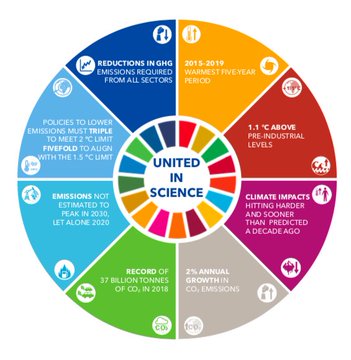Posted
A new report published ahead of key UN climate talks
has warned the world is falling drastically behind in the race to avert
climate disaster, with the five-year period ending in 2019 the hottest
on record.
Key points:
- The new report revealed that global temperatures between 2015-2019 were the hottest on record
- It noted carbon emissions in the same period had risen by 20 per cent
- Its authors also warned of the alarming extent of sea-level rise and melting glaciers
The data, compiled by the World Meteorological Organization (WMO), says climate change is accelerating, with sea-levels rising, carbon dioxide levels increasing and ice sheets melting faster than ever before.
It warned that carbon-cutting efforts have to be intensified immediately and comes ahead of a major UN climate summit in New York on Monday that will be attended by more than 60 world leaders, as secretary-general Antonio Guterres pushes for countries to increase their greenhouse gas reduction targets.
Climate change impacts are hitting harder & sooner than predicted.
New #UnitedinScience report underlines gap between #ClimateAction targets & reality, and shows urgency of the transformation urgently needed to protect our planet. http://bit.ly/2kMGHPn
New #UnitedinScience report underlines gap between #ClimateAction targets & reality, and shows urgency of the transformation urgently needed to protect our planet. http://bit.ly/2kMGHPn

2:12 AM - Sep 23, 2019
The report "highlights the urgent need for the development of concrete actions that halt global warming and the worst effects of climate change," said its authors, the Science Advisory Group to the summit.
Average global temperatures between 2015-2019 were on track to be the hottest of any five years on record, according to the report.
It highlighted that global temperatures have risen by 1.1 degrees Celsius since 1850, and have gone up 0.2C between 2011 and 2015.
And rather than falling, carbon dioxide grew 2 per cent in 2018, reaching a record high of 37 billion tonnes and locking in further warming.
According to the report, carbon emissions between 2015 and 2019 had grown by 20 per cent compared with the previous five years.
Other major takeaways include alarming new data on the extent of sea-level rise.
Sea levels have been rising by an average of 5 millimetres a year in the past five years, compared to 3.2mm a year on average since 1993, with much of the rise attributed to melting glaciers and ice sheets.
The report flagged that Arctic summer sea ice has declined at a rate of 12 per cent per decade over the past 40 years, with the four lowest values between 2015 and 2019.
The amount of ice lost from the Antarctic ice sheet increased by a factor of six each year between 1979 and 2017, while glacier loss for 2015-19 is also the highest for any five-year period on record.
"Sea-level rise has accelerated and we are concerned [about] an abrupt decline in the Antarctic and Greenland ice sheets, which will exacerbate future rise," said WMO secretary-general Petteri Taalas.
"As we have seen this year with tragic effect in the Bahamas and Mozambique, sea-level rise and intense tropical storms led to humanitarian and economic catastrophes."In a meeting with young activists gathered at UN headquarters in New York, Mr Guterres said the world was "losing the race" on climate change
"There is a serious conflict between people and the planet," he saidThe 2015 Paris Agreement saw countries lay out national targets to reduce their emissions to limit long-term temperature rise by either 2 degrees Celsius or 1.5C.
These are benchmarks that will limit in important ways the impact of warming on world weather systems.
But even if all countries meet the goals they set themselves, the world will warm by 2.9C to 3.4C, the report found.
The current levels of ambition would need to be tripled to meet the 2C goal and increased five-fold to meet the 1.5C goal — which is technically still possible.
"This reads like a credit card statement after a five-year-long spending binge," said Dave Reay, chair in carbon management at the University of Edinburgh.
"Our global carbon credit is maxed out," he added.
"If emissions don't start falling there will be hell to pay."
The report comes in the wake of last week's global climate strike, which saw millions of students across the globe hit the streets to demand more action against climate change.
An estimated 300,000 Australian gathered at rallies around the country in one of the largest protest events in the nation's history.
The report also found that heatwaves were the deadliest weather hazard in the 2015-19 period, affecting all continents and setting new national temperature records.
The summer of 2019, which included the hottest ever month on record in July, saw unprecedented wildfires in the Arctic.
In June, these were responsible for emitting 50 megatons of carbon dioxide.
ABC/AFP





No comments:
Post a Comment